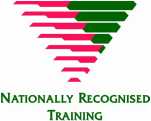 Many people do not know the difference between a nationally accredited course and one that is non-accredited. Reading the name of a course which sounds similar in content to another doesn’t necessarily mean they are the same. A VET accredited course means that the course:
Only Registered Training Organisations (RTOs) can deliver and assess an accredited course, though not all RTOs can deliver and assess any accredited course. RTOs have to apply to their governing body to have relevant training courses and qualifications on their scope. It is illegal to market or even imply that non-accredited training is accredited training. One way to differentiate whether a course is accredited is the use of the Nationally Recognised Training logo (see right). You can always check whether an RTO is legally able to deliver and assess nationally accredited courses through training.gov.au where a full listing of courses and RTOs can be searched. You may wish to consider a nationally accredited course if you require:
|
AuthorMing Thomson Archives
January 2019
Categories |
Quick LinksFutureWest Institute
FutureWest Publishing ABN: 56 532 541 613 ACN: 601 712 065 Copyright 2015 - 2024. All rights reserved. |
Courses |
APPLIED EDUCATION AND TRAINING FOR PROFESSIONALS
EMERGENCY MANAGEMENT COURSES
Training Courses Australia Wide + Distance Learning + RPL (Recognition of Prior Learning)
Perth | Darwin | Sydney | Melbourne | Brisbane | Adelaide | Hobart | Canberra
EMERGENCY MANAGEMENT COURSES
Training Courses Australia Wide + Distance Learning + RPL (Recognition of Prior Learning)
Perth | Darwin | Sydney | Melbourne | Brisbane | Adelaide | Hobart | Canberra

 RSS Feed
RSS Feed